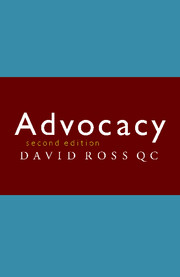Book contents
- Frontmatter
- Contents
- Foreword
- 1 The nature of advocacy
- 2 Preparation
- 3 Witnesses and questions
- 4 Examination-in-chief
- 5 Cross-examination: its qualities
- 6 Cross-examination: method and style
- 7 Cross-examination of experts
- 8 Cross-examination on documents
- 9 Re-examination
- 10 Admissibility, objections and submissions
- 11 The addresses
- 12 Plea in mitigation
- 13 Appeals
- 14 Legal writing
- 15 Etiquette and ethics
- Index
5 - Cross-examination: its qualities
Published online by Cambridge University Press: 31 January 2011
- Frontmatter
- Contents
- Foreword
- 1 The nature of advocacy
- 2 Preparation
- 3 Witnesses and questions
- 4 Examination-in-chief
- 5 Cross-examination: its qualities
- 6 Cross-examination: method and style
- 7 Cross-examination of experts
- 8 Cross-examination on documents
- 9 Re-examination
- 10 Admissibility, objections and submissions
- 11 The addresses
- 12 Plea in mitigation
- 13 Appeals
- 14 Legal writing
- 15 Etiquette and ethics
- Index
Summary
The nature of cross-examination
[5000] Cross-examination is the questioning of an opponent's witness. Some learned judges have described cross-examination as “a potent weapon for probing the credibility and reliability of an accuser's version of events” and “a powerful and valuable weapon for the purpose of testing the veracity of a witness and the accuracy and completeness of his story”. Another judge said: “Cross-examination is an art, and the means used to cut down the effect of the evidence of a witness … are multifarious.” Yet another judge said: “It is the most important part of the advocate's art, because a competent cross-examination is designed to weaken or destroy the opponent's case and to gain support for the client's case.”
Is it necessary?
[5005] Planning will show whether it is necessary to cross-examine a witness at all. You will not cross-examine if the witness does your case no harm, and if you cannot get some advantage to your whole case or disadvantage to your opponent's case.
[I]n cross-examination, every question that does not advance your case injures it. If you do not have a definite object to attain, dismiss the witness without a word. There are no harmless questions here; the most apparently unimportant may bring destruction or victory.
[5010] Sometimes you must cross-examine when it is the last thing you want to do. If the witness gives devastating evidence-in-chief, you must do your best to limit the damage. A cross-examination that simply repeats evidence-in-chief is a serious misjudgment.
- Type
- Chapter
- Information
- Advocacy , pp. 48 - 59Publisher: Cambridge University PressPrint publication year: 2007

